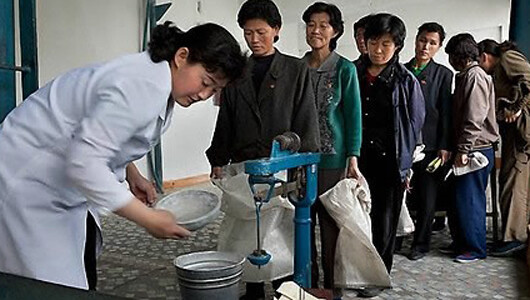hankyoreh
Links to other country sites 다른 나라 사이트 링크
North Korea to have largest food shortage since 2011

In 2015, North Korean farmers produced much more soybeans, cereals and other non-staple crops than the previous year to compensate for the sharp decline in the rice and corn harvest. Despite this, North Korea’s food shortage this year is expected to be about 690,000 tons, the largest since 2011.
According to a report on North Korean food supply and demand in 2015 and 2016 recently published by the UN Food and Agriculture Organization (FAO), North Korea’s yield last year in crops such as soybeans, sorghum, millet, buckwheat, barley, wheat and potatoes (excluding the staples of rice and corn) increased by 35% year on year to 1.27 million tons.
By category, the report estimated that the yield in June 2015 of double-cropped plants like wheat, barley and potatoes was up 20.6% to 363,000 tons, the yield of cereals like sorghum, millet and buckwheat was up 190% to 156,000 tons and the yield of soybeans was up 37% to 220,000 tons.
This is presumed to be the result of planting replacement crops instead of rice during last year’s severe drought. The area of North Korean land used for rice cultivation shrank from 525,000 hectares in 2014 to 465,000 hectares in 2015.
As a result, North Korea’s rice harvest last year decreased by 26% from the previous year to 1.95 million tons (before polishing), while the corn yield was down 3% to 2.3 million tons, according to FAO estimates.
After estimating last October that the rice harvest would be 1.5 million tons, the FAO raised its estimate to 1.8 million tons at the end of last month and revised it once again to 1.95 million tons in this report. Analysts are taking this as evidence that North Korea has substantially stabilized its food production base. Recently, a South Korean Unification Ministry official reported that rice and corn prices in North Korea had been observed to be remarkably stable, despite a variety of sanctions against the North.
Even so, the FAO believes that North Korea’s food shortage – which is to say, the amount of food that Pyongyang will have to import from overseas or receive in foreign aid – will amount to 694,000 tons, the largest amount since 2011.
By Kim Jin-cheol, staff reporter
Please direct questions or comments to [english@hani.co.kr]

Editorial・opinion
![[Column] Park Geun-hye déjà vu in Yoon Suk-yeol [Column] Park Geun-hye déjà vu in Yoon Suk-yeol](https://flexible.img.hani.co.kr/flexible/normal/500/300/imgdb/original/2024/0424/651713945113788.jpg) [Column] Park Geun-hye déjà vu in Yoon Suk-yeol
[Column] Park Geun-hye déjà vu in Yoon Suk-yeol![[Editorial] New weight of N. Korea’s nuclear threats makes dialogue all the more urgent [Editorial] New weight of N. Korea’s nuclear threats makes dialogue all the more urgent](https://flexible.img.hani.co.kr/flexible/normal/500/300/imgdb/original/2024/0424/7317139454662664.jpg) [Editorial] New weight of N. Korea’s nuclear threats makes dialogue all the more urgent
[Editorial] New weight of N. Korea’s nuclear threats makes dialogue all the more urgent- [Guest essay] The real reason Korea’s new right wants to dub Rhee a founding father
- [Column] ‘Choson’: Is it time we start referring to N. Korea in its own terms?
- [Editorial] Japan’s rewriting of history with Korea has gone too far
- [Column] The president’s questionable capacity for dialogue
- [Column] Are chaebol firms just pizza pies for families to divvy up as they please?
- [Column] Has Korea, too, crossed the Rubicon on China?
- [Correspondent’s column] In Japan’s alliance with US, echoes of its past alliances with UK
- [Editorial] Does Yoon think the Korean public is wrong?
Most viewed articles
- 1[Column] Park Geun-hye déjà vu in Yoon Suk-yeol
- 2Thursday to mark start of resignations by senior doctors amid standoff with government
- 3Kim Jong-un expressed ‘satisfaction’ with nuclear counterstrike drill directed at South
- 4[Column] ‘Choson’: Is it time we start referring to N. Korea in its own terms?
- 5N. Korean hackers breached 10 defense contractors in South for months, police say
- 6Will NewJeans end up collateral damage in internal feud at K-pop juggernaut Hybe?
- 7Why Korea shouldn’t welcome Japan’s newly beefed up defense cooperation with US
- 8[Editorial] New weight of N. Korea’s nuclear threats makes dialogue all the more urgent
- 9[Guest essay] The real reason Korea’s new right wants to dub Rhee a founding father
- 10[Column] Yoon’s first 100 days should open our eyes to pitfalls of presidential system